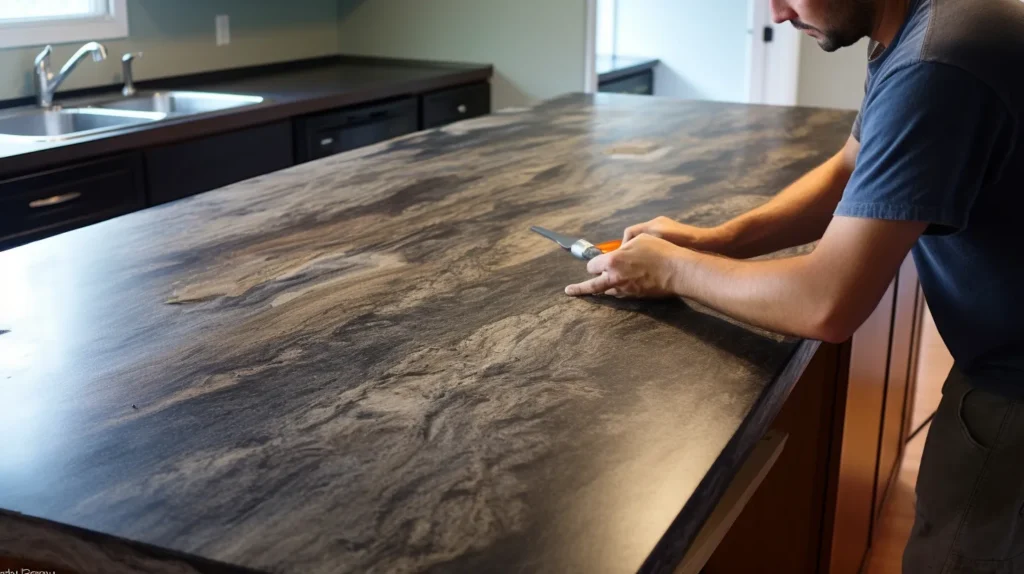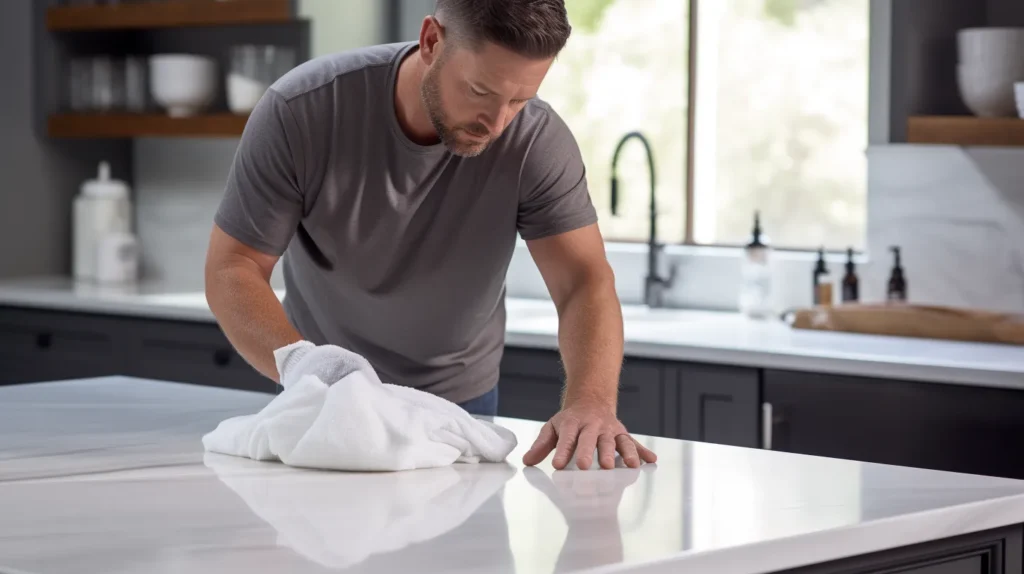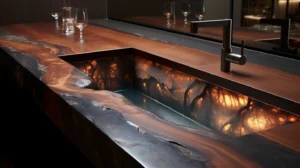Welcome to the world of DIY Countertop Care! Countertops are not just surfaces, they are the central element of your kitchen and bathroom. They are important for both practicality and the overall look of your home. Whether you’re slicing, dicing, mixing, or just gathering around for a chat, these surfaces witness it all. But, like any heavily used area, they’re prone to wear and tear.
In this comprehensive guide, we’ll dive into the art and science of countertop maintenance. We understand that each countertop, with its unique material and finish, demands specific care. We provide personalized advice for various types of countertops, including natural stone, laminate, and solid surfaces.
We’ll explore daily care routines, deep cleaning methods, and how to tackle those inevitable spills and stains. Plus, we’ll share some insider tips on minor repairs, preventative measures, and debunking common countertop care myths.
This isn’t just about maintaining a surface; it’s about preserving a centerpiece of your home life. A well-cared-for countertop doesn’t just retain its beauty; it tells a story of shared meals, laughter, and life’s everyday moments. Whether you’re a DIY enthusiast or a beginner, this guide will provide you with all the tips and tricks necessary to maintain your countertops for years to come.
Join us as we ensure that your countertops remain a source of pride and practicality in your home.

Understanding Your Countertop Material
The key to effective countertop care starts with understanding the material of your countertop. Each material has its unique properties, strengths, and vulnerabilities. Let’s explore the most common types to guide you in providing the best care for your specific countertop.
Natural Stone Countertops
Natural stone countertops, like granite, marble, and quartz, are popular for their beauty and durability. Granite, known for its heat resistance and hardness, can withstand a lot of wear and tear. Marble, with its classic veining, adds elegance but is more porous and prone to staining and scratching. Quartz, while engineered from natural stone, offers a non-porous surface that resists stains and bacteria growth. These materials require regular sealing and specific cleaning agents to maintain their luster and prevent damage.
Laminate Countertops
Laminate countertops are a budget-friendly and versatile option. They come in various patterns and colors, mimicking the look of natural stone or wood. While they are durable and easy to clean, they are not as heat resistant as stone and can be prone to scratching and water damage, especially at seams and edges. For laminate countertops, avoiding harsh abrasives and using mild detergents is key to keeping them looking fresh.
Solid Surface Countertops
Corian and other solid surface materials are popular for their smooth appearance and ease of repairing scratches or burns. They offer a non-porous surface, reducing the risk of bacterial growth and stains. However, they can be sensitive to heat and prolonged exposure to direct sunlight. Regular cleaning with non-abrasive cleaners and avoiding direct heat exposure will keep solid surface countertops in prime condition.
To keep your countertop looking good and working well, it’s important to understand its unique requirements. This way, you can take care of it properly. Stone, laminate, and solid surfaces all need careful handling to last long and remain appealing.
Daily Care and Maintenance
Maintaining your countertops doesn’t have to be a daunting task. With simple, daily practices, you can keep them looking their best. Here’s how you can incorporate countertop care into your everyday routine, regardless of the material.
Cleaning Dos and Don’ts
Consistency is key in countertop care. For all types, daily wiping with a soft cloth or sponge and a suitable cleaner is essential. To clean most materials, use warm, soapy water. However, be careful not to use acidic or abrasive cleaners. These cleaners can harm the surface, especially if it is made of natural stone or laminate. For tougher stains, use a cleaner specific to your countertop’s material. Always avoid harsh scrubbing; instead, opt for gentle circular motions.
Protecting the Surface
Your countertop’s longevity significantly depends on how you use and protect it daily. In order to prevent scratches, it is advisable to use cutting boards. If you want to avoid heat damage, make sure to use hot pads or trivets, especially on natural stone and laminate surfaces. Avoid leaving wet items, such as glasses or bottles, on surfaces for a long time, as this can create water rings or discoloration, especially on natural stone. For solid surface countertops, minimize direct sunlight exposure to prevent discoloration.
Spill Management
Spills are inevitable, but how you handle them can make a difference. It is absolutely essential to immediately clean up any spills on any countertop. Liquids like wine, coffee, or acidic substances can be particularly harmful if left unattended, especially on porous surfaces like marble. Blot the spill gently rather than wiping, as this can spread the liquid. After cleaning up the spill, dry the area thoroughly to prevent water marks or potential damage.
To keep your countertops clean and beautiful, incorporate these easy and effective habits into your daily routine. Taking good care of your countertops, with regular attention and proper techniques, can make them last longer and keep them looking inviting and functional.
Deep Cleaning Techniques
Regular cleaning is important, but sometimes your countertops need a more thorough cleaning to make them shine again and get rid of any dirt or residue build-up. Here’s how to deep clean different types of countertops without causing damage.
Technique for Natural Stone
For natural stone countertops like granite, marble, or quartz, deep cleaning requires gentle yet effective methods. Start by wiping the surface with a soft cloth and a mild detergent diluted in warm water. To remove stubborn stains, make a paste using baking soda and water for marble and granite. For quartz, use a mixture of vinegar and water. Apply the paste, cover with plastic wrap, and leave it for a few hours or overnight for tough stains. Gently wipe away the paste with a soft cloth, rinse with water, and dry thoroughly. Remember to reseal granite and marble countertops periodically to protect against stains and etching.
Technique for Laminate
Laminate countertops can be refreshed with a solution of water and mild detergent or a vinegar-water mix for more shine. Apply the solution using a soft cloth or sponge, ensuring you cover the entire surface. For areas with hardened residue, a bit of baking soda mixed with water can act as a gentle abrasive. Rinse the countertop with clean water and dry thoroughly to avoid streaks. Avoid using harsh chemicals or abrasive pads, as these can scratch or damage the laminate’s surface.
Technique for Solid Surfaces
Solid surface countertops, like Corian, benefit from a routine deep clean to maintain their seamless appearance. Use soapy water or an ammonia-based cleaner for routine cleaning. For deep cleaning, you can use a mild abrasive cleaner or a baking soda paste. Apply it gently with a soft cloth in circular motions, focusing on discolored or stained areas. Rinse thoroughly with water and dry with a clean cloth. To restore shine or remove scratches, lightly buff the surface with fine-grit sandpaper, then thoroughly clean it.
Deep cleaning your countertops not only helps in maintaining their appearance and hygiene but also extends their life. It’s an investment in the beauty and functionality of your home that pays off in the long run.
Managing Stains and Spills
Stains and spills happen in every home, but you can prevent them from leaving long-lasting marks on your countertops. Here’s how to effectively manage and remove stains from different countertop materials.
Immediate Actions
Taking prompt action is the crucial initial stage in stain management. The longer a spill sits, especially on porous surfaces, the harder it is to remove. For any countertop type, blot spills immediately with a soft cloth or paper towel. Avoid wiping, as this can spread the spill. For oily stains, a little dish soap added to water can be effective. For acidic substances like wine or lemon juice, quick removal is key to prevent etching or discoloration.
Stain Removal Tips
Each countertop material has specific needs when it comes to stain removal:
- Natural Stone: For persistent stains on materials like granite or marble, a poultice made from baking soda and water can be effective. Apply the poultice to the stain, cover with plastic wrap, and leave it for 24 hours before wiping it off. For more resilient stains, a commercial stone stain remover may be necessary. Remember to reseal the surface afterward to protect against future stains.
- Laminate: Laminate is less porous but can still stain, especially with prolonged exposure to certain substances. For tough stains, a paste of baking soda and water can be gently applied. For ink or marker stains, a bit of rubbing alcohol on a cotton ball can be dabbed onto the stain. Always rinse with water and dry after treating stains.
- Solid Surfaces: Solid surface countertops like Corian are non-porous, making them resistant to staining. However, for tough stains, a mixture of water and bleach (in a safe ratio) can be used. Apply the solution, let it sit for a few minutes, then rinse thoroughly. For scratches or burns, light sanding can help restore the surface.
Remember, the best defense against stains is understanding the vulnerabilities of your countertop material and acting quickly when spills occur. With these tips, you can keep your countertops looking as pristine as the day they were installed.
Preventative Measures
Preventing damage to your countertops is often easier and more cost-effective than repairing it. By adopting these preventative measures, you can ensure the long-lasting beauty of your countertops:
Regular Maintenance Tips
- Use Cutting Boards: To prevent scratches, always use cutting boards when chopping, slicing, or dicing. Avoid cutting directly on the countertop surface, especially if it’s made of natural stone or laminate.
- Use Trivets and Hot Pads: Protect your countertops from heat damage by using trivets or hot pads under hot cookware, pans, and appliances. Hot pots or pans can leave permanent marks on some surfaces.
- Avoid Impact: Be cautious when handling heavy objects or appliances near your countertops. Dropping heavy items can cause chipping or cracking, particularly on solid surface countertops.
- Regular Cleaning: Stick to a daily cleaning routine using mild, non-abrasive cleaners. This prevents the buildup of dirt and grime that can lead to staining or discoloration.
Protective Products and Tools
- Seal Natural Stone Regularly: If you have natural stone countertops, ensure they are properly sealed according to manufacturer recommendations. Sealing helps prevent stains and maintains the stone’s integrity.
- Invest in Cutting Mats: While cutting boards are essential, consider using cutting mats for extra protection. These flexible mats are gentle on your countertop and easy to clean.
- Soft Cloth or Sponge: Use a soft cloth or sponge for cleaning rather than abrasive scrubbers or steel wool, which can scratch the surface.
- Microfiber Towels: Microfiber towels are excellent for drying countertops as they are gentle and leave no streaks.
- Avoid Harsh Chemicals: Stay away from harsh chemicals, bleach, and abrasive cleaners, as they can damage the finish of your countertops.
To keep your countertops looking great for a long time, follow these prevention tips in your daily routine. They will help reduce the risk of damage and maintain their pristine appearance. Taking preventive measures for your countertops saves you time and money, while also keeping them beautiful and functional.
Professional Help and When to Seek It
While DIY countertop care can work wonders, there are times when professional assistance becomes necessary. Understanding when to call in the experts can prevent further damage and ensure the longevity of your countertops.
Recognizing Serious Damage
- Deep Scratches or Chips: If your countertops have deep scratches, chips, or cracks that compromise their integrity, it’s time to consult a professional. Attempting to repair significant damage yourself can lead to further issues.
- Stains That Won’t Budge: Some stains, especially on porous surfaces like natural stone, may require specialized knowledge and equipment to remove. If your efforts to remove a stubborn stain have been unsuccessful, it’s best to seek professional help.
- Severe Discoloration: If your countertops have significant discoloration or fading, particularly due to UV exposure or chemical damage, a professional can assess the extent of the damage and recommend appropriate restoration techniques.
Choosing a Professional Service
When selecting a professional countertop care service, consider the following factors:
- Experience: Look for professionals with a proven track record in countertop care, especially with your specific material (e.g., natural stone, laminate, solid surface).
- Certifications: Check if the professionals have industry certifications, which indicate their expertise in the field.
- References: Ask for references or read reviews from previous clients to gauge the quality of their work and customer satisfaction.
- Quotes: Obtain quotes from multiple professionals to ensure fair pricing and a comprehensive scope of work.
- Insurance: Ensure that the professionals you hire are insured and can cover any potential damages during the restoration process.
Remember that professional assistance is an investment in the long-term beauty and functionality of your countertops. Taking proactive steps to address issues beyond your DIY capabilities is important to ensure that your countertops continue to enhance your home’s appeal.
Innovative Care Products
In the world of countertop care, innovation is your ally. Today, there is a wide array of innovative products designed to make caring for your countertops more efficient and effective. Here are some innovative care products that can help you keep your countertops in top-notch condition:
1. Countertop Sealers and Enhancers
- Nano Sealants: These advanced sealants use nanotechnology to create an ultra-thin protective layer on your countertops. They offer superior stain resistance and are especially beneficial for natural stone surfaces.
2. pH-Balanced Cleaners
- pH-balanced Cleaning Solutions: These cleaners are formulated to maintain the pH balance of your countertop material. They are gentle yet effective at removing dirt and stains without causing damage.
3. Microfiber Cleaning Cloths
- Microfiber Cleaning Cloths: These ultra-fine, lint-free cloths are perfect for cleaning countertops. They are highly absorbent and leave no streaks, ensuring a sparkling finish.
4. Smart Cleaning Tools
- Smart Cleaning Tools: Some devices, like smart vacuum robots, can help you keep your kitchen or bathroom clean with minimal effort. These devices can be programmed to clean your countertops regularly.
5. UV-C Disinfection
- UV-C Disinfection: UV-C light devices are designed to kill bacteria and viruses on surfaces. While they aren’t a replacement for regular cleaning, they can add an extra layer of hygiene, especially in high-use areas.
6. Eco-Friendly Cleaning Solutions
- Eco-Friendly Cleaning Solutions: There is a growing range of eco-friendly and biodegradable cleaning products that are safe for both your countertops and the environment.
7. Stain Repellent Coatings
- Stain Repellent Coatings: These coatings create a barrier that prevents stains from penetrating the surface. They are especially useful for porous materials like natural stone.
8. Touchless Faucets
- Touchless Faucets: While not a direct countertop care product, touchless faucets can help reduce the spread of germs and stains caused by touching the faucet with dirty hands.
9. Smartphone Apps
- Smartphone Apps: Some apps can help you schedule and track your countertop maintenance routines. They send reminders for sealing, cleaning, and other care tasks.
10. Self-Healing Materials
- Self-Healing Materials: In recent years, some countertop materials have been developed with self-healing properties. Small scratches and scuffs can disappear over time, reducing the need for repairs.
These new products can make caring for your countertops easier and help them last longer while keeping them in great shape. When incorporating these products into your care regimen, always follow the manufacturer’s instructions for the best results.
Conclusion
In the world of home design, your countertops are more than just functional surfaces; they are the stage for the daily rituals of life. From preparing meals to sharing stories, these surfaces witness it all. That’s why it’s essential to care for them diligently to ensure their long-lasting beauty and functionality.
Throughout this guide, we’ve delved into the art and science of DIY countertop care. We’ve looked at different types of countertops, including natural stone, laminate, and solid surfaces. We’ve shared daily care routines, deep cleaning techniques, and how to manage stains and spills effectively.
But countertop care goes beyond routine maintenance. It’s about preserving the heart of your home. It’s about nurturing the memories that happen around these surfaces. It’s about making your countertops not just survive, but thrive.
As you embark on your countertop care journey, remember that prevention is often the best cure. To keep your countertops in good condition, use cutting boards, trivets, and appropriate cleaning products. And when the inevitable spill or stain occurs, swift action can prevent lasting damage.
We have also looked into new care products and sustainable practices that can improve your care routine and help the environment. These options empower you to care for your countertops effectively while minimizing your ecological footprint.
In closing, we encourage you to approach countertop care as an act of love for your home. Cleaning and protecting your space is important for its beauty and functionality. Your countertops, with proper care, will continue to bear witness to the cherished moments that make your house a home.
Thank you for joining us on this journey of countertop care. With the knowledge and techniques you have, you can make sure your countertops stay beautiful and useful in your home for a long time.
FAQs
1. How often should I seal my natural stone countertops?
- The frequency of sealing natural stone countertops depends on the type of stone and its usage. Granite should be sealed every 1 to 3 years, while marble needs sealing more often, usually every 6 to 12 months. However, it’s essential to follow the manufacturer’s recommendations and perform a water droplet test to determine when resealing is necessary.
2. Can I use vinegar to clean my countertops?
- While vinegar is a natural cleaner, it’s not recommended for all countertop materials. It can be too acidic for natural stone like marble and limestone, potentially causing etching. Laminate and solid surface countertops can handle vinegar in small amounts. It’s better to mix it with water and not leave it on for too long.
3. What should I do if my laminate countertop has a burn mark?
- To remove burn marks on laminate countertops, you can use a mild abrasive cleaner or a paste made of baking soda and water. Gently scrub the affected area in a circular motion, rinse, and dry. If the damage is extensive, consider consulting a professional for repair or replacement.
4. How can I prevent my solid surface countertop from developing a dull appearance over time?
- Clean your solid surface countertop regularly with mild, soapy water and avoid using abrasive cleaners to keep it shiny. You can also lightly buff the surface with a fine-grit sandpaper if it loses its luster. Protect it from prolonged exposure to direct sunlight, which can lead to fading.
5. Are there eco-friendly alternatives for cleaning my countertops?
- Yes, there are eco-friendly cleaning options. You can use a mixture of water and baking soda for gentle scrubbing. You can also find eco-friendly countertop cleaners that are safe for your countertops and the environment. These cleaners don’t contain harsh chemicals and are commercially available.





